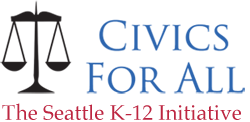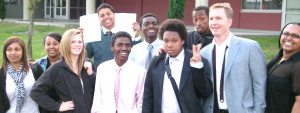Job and Career Readiness
Civics builds essential work-place knowledge,skills, and dispositions
- The American Enterprise Institute recently announced that civic literacy is just as critical to success as mathematics and literacy, according to the findings of a massive ten paper research effort on civics education published in November 2012 by the Harvard Press.
- Civics lessons increase job-readiness, according to this ABA commissioned report.
- The Seattle School District has long recognized that a wholistic, K-12 interdisciplinary approach to managing curricula requires essential touchstones like “Reading across the curriculum” and “Math across the curriculum” – “Civics across the curriculum” supports this crucial approach by providing content knowledge AND dispositions that can help kids, teachers, and schools all achieve greater success.
- Teaching more civics honors our city’s commitment to give all of our children the best possible chance to succeed in school and to be actively engaged in Seattle’s great civic traditions.
- Washington’s OSPI already requires science teachers to “provide…social studies and humanities” perspectives in environmental units as per RCW 28.A230.020 and WAC 180-50-115 –this wise policy honors Seattle’s environmental tradition and offers a great starting place to deepen civics connections in science classes, when efficacious.
- The Civics for All Initiative supports and seeks to expand the use of key civics curricula in the Seattle Public Schools, including fifth grade use of Project Citizen and iCivics, an online civics/politics/government program promoted by Justice Sandra Day O’Connor.
- Our initiative is in alignment with the powerful and growing civics education movement being led by groups like the Center for Civic Education and Justice O’Connor’s organization the Campaign for the Civic Mission of Schools.
- Civics curriculum is abundant. We should use it!





